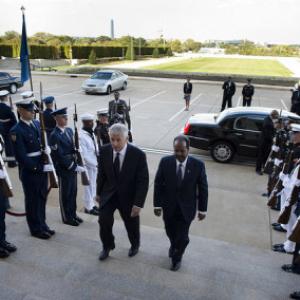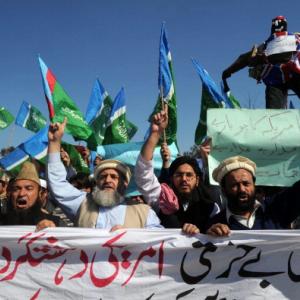Jim Michaels writes for USA Today.
Posts By This Author
Pentagon: Airstrike Kills Terror Leader in Somalia
The Pentagon on Sept. 5 confirmed that the leader of al-Shabab, an al-Qaida-linked organization in Africa, was killed in a U.S. airstrike in Somalia this week.
The leader, Ahmed Abdi Godane, was targeted Sept. 1 in an airstrike that hit a vehicle and compound in a militant stronghold south of the capital, Mogadishu.
Al-Shabab has been linked to a number of attacks in Africa, including the bloody siege at the upscale Westgate Mall in Nairobi, Kenya, in September 2013 that killed 67 people.
“Removing Godane from the battlefield is a major symbolic and operational loss to al-Shabab,” Pentagon Press Secretary Rear Admiral John Kirby said in a statement.
At the time of the strike, the Pentagon said it could not confirm Godane’s death.
In Kenya Attack, Weakened Al-Shabab Seeks a Foothold in Kenya
The deadly mall attack in Kenya on Saturday is a sign that the al-Qaida-affiliated group that carried it out has been dealt a blow in Somalia and they are looking to generate headlines with more high-profile attacks in the region, a regional expert says.
The militant group that carried out the attack, al-Shabab, wants to establish an Islamist government in Somalia.
In recent years, however, African Union troops in Somalia have driven the militants out of most parts of the capital city of Mogadishu as a U.S.-supported government there has attempted to establish control over the country. At one time, al-Shabab controlled parts of Mogadishu.
The attack in Nairobi underscores al-Shabab’s organizational skills and their commitment to die for a cause, said David Shinn, a former U.S. ambassador to Ethiopia and a professor at George Washington University.
But it also highlights that the group has to rely on high-profile terrorist attacks that generate headlines because they lack popular support and have failed in any direct fights with African Union forces in Somalia.
“Increasingly, al-Shabab has alienated the average Somali,” Shinn said.
Quran Burning at U.S.-run Military Base: 'Tailor-made' for Taliban
The Taliban is attempting to capitalize on the outbreak of violence that followed the inadvertent burning of a Quran by NATO troops by characterizing the war as a conflict between infidels and Islam, analysts said.
"It's tailor-made to their argument that the United States is trying to desecrate and destroy Islam," said Seth Jones, an analyst at Rand Corp. and author of In the Graveyard of Empires: America's War in Afghanistan. "It's patently untrue."
On Monday, a suicide car bomber launched an attack against the gates of a coalition base in Jalalabad, killing nine Afghans. The Taliban said the attack was revenge for the Quran burning, The Associated Press reported.
Over the weekend, two military advisers were found dead in their office at the Interior Ministry, a highly secure facility in Kabul. In response, NATO withdrew all its advisers from government ministries as Afghan police searched for a suspect in the killings.
The Quran burning threatens to undermine cooperation between Afghan and coalition forces, which is at the heart of the U.S. strategy to withdraw its troops and turn over security to Afghan forces, analysts said.


